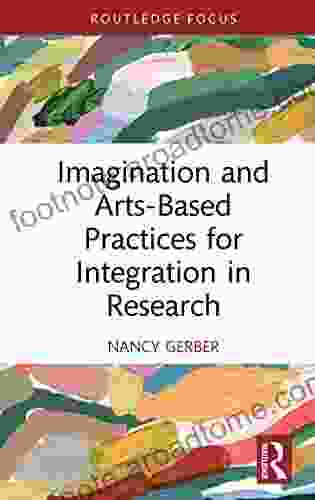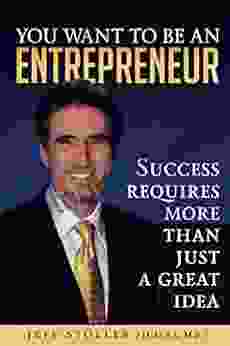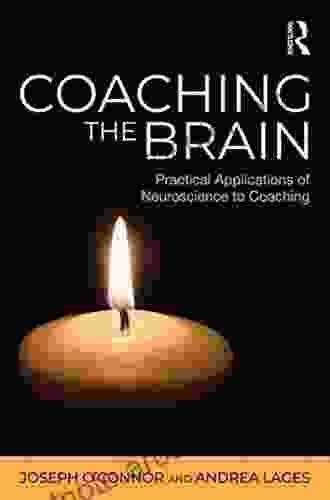Unlocking the Power of the Mind: Practical Applications of Neuroscience to Coaching

In the rapidly evolving field of coaching, neuroscience has emerged as a game-changer, providing coaches with a deeper understanding of the human brain and its impact on behavior and performance. By incorporating neuroscience principles into their practice, coaches can enhance their effectiveness in helping clients achieve their goals, overcome challenges, and unlock their full potential.
4.8 out of 5
| Language | : | English |
| File size | : | 1723 KB |
| Text-to-Speech | : | Enabled |
| Screen Reader | : | Supported |
| Enhanced typesetting | : | Enabled |
| Word Wise | : | Enabled |
| Print length | : | 220 pages |
The Brain and Coaching
Neuroscience has revealed that the brain is a complex and dynamic organ, capable of remarkable plasticity and adaptation. This plasticity means that the brain can be shaped and rewired through experiences, learning, and deliberate practice.
Coaches can leverage this plasticity to help their clients:
- Develop new skills and habits
- Improve their decision-making and problem-solving abilities
- Enhance their motivation and resilience
- Overcome limiting beliefs and self-sabotaging behaviors
Practical Applications of Neuroscience
Here are some specific, practical applications of neuroscience that coaches can use to enhance their practice:
1. Motivating Clients
Neuroscience has identified key brain regions involved in motivation, including the nucleus accumbens and the prefrontal cortex. Understanding how these regions work can help coaches develop strategies to increase clients' intrinsic motivation and drive.
2. Supporting Decision-Making
The brain uses a variety of cognitive processes to make decisions, weighing the pros and cons of different options. Coaches can help clients improve their decision-making by teaching them about these processes and providing them with tools to analyze information and make informed choices.
3. Facilitating Behavior Change
Behavior change involves creating new neural pathways in the brain. Coaches can help clients break old habits and create new ones by providing them with practical exercises and techniques that strengthen desired neural connections.
4. Overcoming Challenges
When faced with challenges, the brain often reacts with fear and anxiety. Coaches can use neuroscience to help clients reframe their perception of challenges as opportunities for growth and learning, reducing stress and enhancing resilience.
Benefits of Incorporating Neuroscience
Incorporating neuroscience into coaching practice offers numerous benefits, including:
- Enhanced client outcomes
- Increased client engagement and motivation
- Improved coach-client rapport and understanding
- Expanded coaching toolkit and techniques
- Increased professional credibility and marketability
Practical Applications of Neuroscience to Coaching provides coaches with the latest scientific insights into the human brain and its impact on behavior and performance. By incorporating these principles into their practice, coaches can empower their clients to achieve extraordinary results, unlock their full potential, and live more fulfilling lives.
If you're a coach looking to take your practice to the next level, this book is an indispensable resource that will provide you with the knowledge, tools, and techniques you need to make a profound impact on your clients' lives.
Free Download your copy of Practical Applications of Neuroscience to Coaching today and start transforming your coaching practice.
Free Download Now
4.8 out of 5
| Language | : | English |
| File size | : | 1723 KB |
| Text-to-Speech | : | Enabled |
| Screen Reader | : | Supported |
| Enhanced typesetting | : | Enabled |
| Word Wise | : | Enabled |
| Print length | : | 220 pages |
Do you want to contribute by writing guest posts on this blog?
Please contact us and send us a resume of previous articles that you have written.
 Book
Book Novel
Novel Page
Page Chapter
Chapter Text
Text Story
Story Genre
Genre Reader
Reader Library
Library Paperback
Paperback E-book
E-book Magazine
Magazine Newspaper
Newspaper Paragraph
Paragraph Sentence
Sentence Bookmark
Bookmark Shelf
Shelf Glossary
Glossary Bibliography
Bibliography Foreword
Foreword Preface
Preface Synopsis
Synopsis Annotation
Annotation Footnote
Footnote Manuscript
Manuscript Scroll
Scroll Codex
Codex Tome
Tome Bestseller
Bestseller Classics
Classics Library card
Library card Narrative
Narrative Biography
Biography Autobiography
Autobiography Memoir
Memoir Reference
Reference Encyclopedia
Encyclopedia Colleen Kelly Alexander
Colleen Kelly Alexander Christopher Willard
Christopher Willard Christopher Brooks
Christopher Brooks Judith Valente
Judith Valente Gwen Shamblin Lara
Gwen Shamblin Lara Claire Elise Katz
Claire Elise Katz Frank Buschmann
Frank Buschmann James Robert Enterline
James Robert Enterline Nick Jones
Nick Jones Clare Collins
Clare Collins Cinzia Bianucci
Cinzia Bianucci Klaus Denecke
Klaus Denecke Sarah James
Sarah James Geoffrey Engelstein
Geoffrey Engelstein Roberta Bayley
Roberta Bayley Christophe Morin
Christophe Morin Eric Gordon
Eric Gordon Clinton M Browner
Clinton M Browner Gereon Meyer
Gereon Meyer Colin Clark
Colin Clark
Light bulbAdvertise smarter! Our strategic ad space ensures maximum exposure. Reserve your spot today!

 George OrwellImagination and Arts-Based Practices for Integration in Research: A Path to...
George OrwellImagination and Arts-Based Practices for Integration in Research: A Path to...
 Brett SimmonsUnlock the Secrets of Ventriloquism: Dive into Maher Course of Ventriloquism...
Brett SimmonsUnlock the Secrets of Ventriloquism: Dive into Maher Course of Ventriloquism...
 Aaron BrooksUnlock Your Inner Entrepreneur: The Ultimate Guide to Starting and Thriving...
Aaron BrooksUnlock Your Inner Entrepreneur: The Ultimate Guide to Starting and Thriving... Sam CarterFollow ·12.9k
Sam CarterFollow ·12.9k Earl WilliamsFollow ·9.4k
Earl WilliamsFollow ·9.4k Mark TwainFollow ·17k
Mark TwainFollow ·17k Chad PriceFollow ·10k
Chad PriceFollow ·10k Albert ReedFollow ·11.4k
Albert ReedFollow ·11.4k Ashton ReedFollow ·19k
Ashton ReedFollow ·19k Billy PetersonFollow ·15.2k
Billy PetersonFollow ·15.2k Denzel HayesFollow ·19k
Denzel HayesFollow ·19k

 Charles Bukowski
Charles BukowskiUnlock Your Entrepreneurial Potential: Start Small,...
Are you ready to embark on an exciting journey...

 Braeden Hayes
Braeden HayesUnveiling the Extraordinary Tale of "Weird Girl With...
A Journey of...

 Shawn Reed
Shawn ReedLearning To Love Ourselves As We Are: A Journey Towards...
In the tapestry of life, self-love emerges...

 Allan James
Allan JamesQuick Guide to Pipeline Engineering: Your Gateway to...
Welcome to the realm of...

 Beau Carter
Beau CarterLife With and After an Addict: A Journey of Understanding...
Addiction is a complex and devastating...
4.8 out of 5
| Language | : | English |
| File size | : | 1723 KB |
| Text-to-Speech | : | Enabled |
| Screen Reader | : | Supported |
| Enhanced typesetting | : | Enabled |
| Word Wise | : | Enabled |
| Print length | : | 220 pages |








